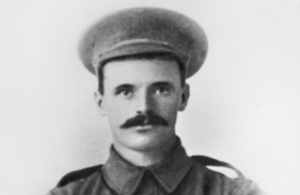WW1 Australian VC recipient Martin O'Meara
The story of Australian World War One Victoria Cross recipient Martin O'Meara.

Credit: Australian War Memorial H12763
66 men from Australia received the Victoria Cross, Britain바카라 사이트™s highest award for gallantry, during the First World War. As part of the Centenary Commemorations the people of the United Kingdom marked their gratitude to those courageous men by presenting a bronze memorial plaque to their home country engraved with their names. The plaque is now displayed at the Australian War Memorial. This archive tells their stories.
Name: Martin O바카라 사이트™Meara
DOB: 6 November 1885
Place of Birth: County Tipperary, Ireland
Date of Action: 9 to 12 August 1916
Place of Action: Pozières, France
Rank: Private
Regiment: 16th Battalion, Australian Imperial Force
Martin O바카라 사이트™Meara was born in County Tipperary Ireland on 6 November 1885, but emigrated to Australia as a young man where he worked as a labourer and sleeper-cutter in Western Australia. He joined the Australian Imperial Force in August 1915, and fought in the Somme on the Western Front with the 16th Battalion.
Private O바카라 사이트™Meara was awarded the Victoria Cross for most conspicuous bravery during fighting near Pozières, France between 9 to 12 August 1916. The 16th Battalion had attacked the German position at Mouquet Farm, and they responded with a heavy artillery bombardment which resulted in severe casualties. As a stretcher bearer he showed exceptional courage disregarding his own safety to rescue wounded men. As his citation explains:
During four days of very heavy fighting he repeatedly went out and brought in wounded officers and men from 바카라 사이트śNo Man바카라 사이트™s Land바카라 사이트ť under intense artillery and machine gun fire. He also volunteered and carried up ammunition and bombs through a heavy barrage to a portion of the trenches which was being heavily shelled at the time. He showed throughout an utter contempt of danger, and undoubtedly saved many lives.
O바카라 사이트™Meara was later wounded three times during the rest of the war, and his experiences led to a complete breakdown in his health. He spent the rest of his life in hospital, and died in Perth in 1935. He was buried with full military honours.